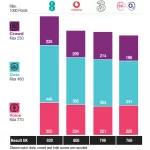Sponsored Links
Global Broadband Prices Still Dropping
Posted: 09th Aug, 2006 By: MarkJ
The latest research from Point Topic reports that entry level xDSL broadband prices fell by 9.3% during the second quarter of 2006. By comparison, similar cable (ntl:Telewest) based product prices dropped 4.5%:
As a result, the price gap between DSL and cable modem services has widened up to US$4.27 (£2.2). While FTTx prices remained constant, the broadband shared market is still being dominated by DSL and cable modem services.
Among the 18 DSL operators included in Point Topics tariff benchmark survey, 5 of them (primarily in North America and EMEA) reduced their monthly tariffs by up to 50%. Bell Canada was the only operator increased its entry level package up by 16.9%. This is due to a service upgrade of its 256Kbps BASIC package to a faster 1Mbps download speed. Overall, the average DSL monthly tariff was US$27.44 (£14.40) with Chunghwa (Taiwan) still being rated as the cheapest DSL provider.
For cable modem services, 2 of 16 operators had price reductions of up to 33.4% in Q2 2006. Time Warner, being the operator with the biggest price cut, introduced a new entry level service - Road Runner Intro offering download speeds up to 768k and priced at US$29.90.
Likewise, OptusNet also reduced its EasyStart package by 25% priced at US$22.10 which was the cheapest cable modem service in the SEA (South East Asia) region. Although there had been progressive price reduction in cable modem service, the average cable modem rental (US$32.32 (£17)) is still comparatively more expensive than DSL services.
In the FTTx market, the prices have remained unchanged since Q2 2005. Table 1 provides an overview of the average monthly rentals across the three regions. With this regional breakdown analysis, it was shown that SEA had the cheapest average FTTx rental (US$31.69) which was even cheaper than the cable modem rental within the same region and America.
Unfortunately the research does not cover other broadband technology types and makes no specific mention of the UK market. Its hard to imagine broadband prices falling much further than they already have, but then we last said that two years ago =).
As a result, the price gap between DSL and cable modem services has widened up to US$4.27 (£2.2). While FTTx prices remained constant, the broadband shared market is still being dominated by DSL and cable modem services.
Among the 18 DSL operators included in Point Topics tariff benchmark survey, 5 of them (primarily in North America and EMEA) reduced their monthly tariffs by up to 50%. Bell Canada was the only operator increased its entry level package up by 16.9%. This is due to a service upgrade of its 256Kbps BASIC package to a faster 1Mbps download speed. Overall, the average DSL monthly tariff was US$27.44 (£14.40) with Chunghwa (Taiwan) still being rated as the cheapest DSL provider.
For cable modem services, 2 of 16 operators had price reductions of up to 33.4% in Q2 2006. Time Warner, being the operator with the biggest price cut, introduced a new entry level service - Road Runner Intro offering download speeds up to 768k and priced at US$29.90.
Likewise, OptusNet also reduced its EasyStart package by 25% priced at US$22.10 which was the cheapest cable modem service in the SEA (South East Asia) region. Although there had been progressive price reduction in cable modem service, the average cable modem rental (US$32.32 (£17)) is still comparatively more expensive than DSL services.
In the FTTx market, the prices have remained unchanged since Q2 2005. Table 1 provides an overview of the average monthly rentals across the three regions. With this regional breakdown analysis, it was shown that SEA had the cheapest average FTTx rental (US$31.69) which was even cheaper than the cable modem rental within the same region and America.
Unfortunately the research does not cover other broadband technology types and makes no specific mention of the UK market. Its hard to imagine broadband prices falling much further than they already have, but then we last said that two years ago =).
Search ISP News
Search ISP Listings
Search ISP Reviews
Latest UK ISP News








Cheap BIG ISPs for 100Mbps+
150,000+ Customers | View More ISPs
Cheapest ISPs for 100Mbps+
Modest Availability | View More ISPs
Latest UK ISP News
Helpful ISP Guides and Tips
Sponsored Links
The Top 15 Category Tags
- FTTP (6773)
- BT (3877)
- Politics (3062)
- Business (2757)
- Openreach (2654)
- Building Digital UK (2505)
- Mobile Broadband (2463)
- FTTC (2139)
- Statistics (2119)
- 4G (2083)
- Virgin Media (2013)
- Ofcom Regulation (1773)
- 5G (1720)
- Fibre Optic (1598)
- Wireless Internet (1591)
Sponsored
Copyright © 1999 to Present - ISPreview.co.uk - All Rights Reserved - Terms , Privacy and Cookie Policy , Links , Website Rules
































